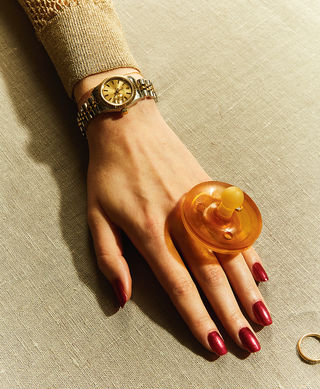How the Most Satisfied Couples Balance Sex and Power
People cheat not only for sex but also for passion—to feel alive and to be wanted. Now it's women's turn to unleash lust.
By Hara Estroff Marano published June 21, 2019 - last reviewed on January 14, 2020

It was a running joke between them. Rather than stealing moments as most illicit lovers do, Dynah and Zach met every Thursday afternoon for a happy hour (or two) that started in a bar and ended between bedsheets—before she went home to her husband and 6-year-old daughter. There were no fake out-of-town meetings, no side-door entrances and sequenced exits—just months of clockwork coupling. “I always felt on guard, but we could plausibly be seen in public because we were coworkers,” Dynah, 36, says.
Eventually, the irony of smuggled sex on a schedule hit her so hard it forced serious self-examination. She hadn’t been looking for love. Even after eight years of marriage, she and her husband were committed partners. As the manager of a Denver law firm, she had spent a lot of time breaking in the young new associate. “Intimacy was established in working together; the opportunity was mine for the taking,” she recalls. “I was able to make a very selfish personal choice in which I felt completely in control. Being wanted felt so invigorating. Being a wife and mother had begun to define me.”
Eight months in, she revealed the affair to her husband and ended it. Things were awkward at first. “I definitely spent a few nights on the couch. He cried some. We didn’t want to speak to each other for a while. I was kind of in mourning, missing something I really enjoyed with someone I really cared about. I was also mourning the loss of who I got to be for a time. I had felt like a whole person, a woman who was also vivacious and attractive and sexual, and suddenly I had to put her back on the shelf.” She not only had to rein herself in but “do it graciously, because I was lucky to still have a marriage.”
The two scheduled a session of therapy; they felt they needed a moderator in order to talk freely. “The feeling of not being a desirable woman anymore—that’s on me,” says Dynah. “How could I communicate that to my husband so we could make our relationship better? I wanted that feeling —with him.” So she did for the marriage what she had done in the affair: “We put sex and dating on the calendar. After all, I had been fine with that in the affair—even waiting for it every week.”
Dynah never liked the secrecy of the affair. But she has few regrets about her extramarital adventure. “I expected I would feel worse than I did about it. I don’t consider myself a psychopath, but I wondered why I didn’t have an overwhelming sense of guilt.”
That’s perhaps because romantic and sexual relationships are changing before our eyes as power shifts between men and women. Nearly 40 percent of women now earn more than their husbands, according to the website FiveThirtyEight. As women gain social and economic power, they are also becoming sexually independent. Female sexuality is being unleashed: It’s not that our grandmothers had less desire—they just had fewer opportunities and far more to lose. “Now women are appropriating lust, which in some ways used to be a male privilege,” says Terry Real, a Massachusetts psychotherapist and author of The New Rules of Marriage.
As with marriage, affairs are becoming gender-equal, too. In fact, under the age of 30, more women than men are having affairs today, according to the General Social Survey 2010–2016, conducted by the National Opinion Research Council of the University of Chicago. That reflects a return, says anthropologist Helen Fisher, to conditions more like those of our ancient hunter-gatherer forebears, the original dual-income families.
At street level, a number of forces inside and outside relationships are shaping the current state of affairs, at least among heterosexual couples. Both men and women are cheating because they can; they have more opportunities than ever, and they don’t necessarily intend to leave their marriage. They work closely together. They travel together. And technology has made marriages—indeed, all institutions—more porous than ever, with seductive channels of connection ever open to others on the outside. In the endless struggle people wage between autonomy and commitment, sometimes an extramarital fling is just something for oneself, a moment of pleasure, especially in a culture that values narcissism.

Frontline observers report that, for a growing number of women, an affair is the fallout from radically reversed gender roles at home. Sometimes, too, women seek in an affair relief from the burden of caring for others or escape from the hothouse of emotional intimacy that modern marriage can be. Child-rearing has become such an intensive enterprise that adults may find their own needs ignored. Despite their expectations for intimacy, many people cheat because directly asking a regular sex partner for what they want, especially sexually—and even defining what infidelity is (texting with an ex? secretly watching porn?)—seems too…icky. And sometimes—but only sometimes—an affair is the symptom of a relationship that is beyond repair.
Mostly, however, people cheat to feel alive and to expand their sense of self. In affairs, people find possibility and rediscover themselves. Infidelity often pitches people into a conflict between their values and their behavior. Desire, nevertheless, is a powerfully animating force, perhaps the strongest in the human repertoire. “People are looking to reconnect with lost parts of themselves,” says Esther Perel, a New York-based psychotherapist and author of The State of Affairs: Rethinking Infidelity. “Relational betrayal comes in many forms. The betrayer often feels betrayed, too: Are you interested in loving me the way that I want? The victim of the affair is not always the victim of the marriage.”
The emotional pain wrought by secrecy and feelings of betrayal is an undeniable consequence of infidelity once it is revealed, and affairs hurt the noninvolved partner as much as they ever have. They have long been the leading cause of divorce. But a breakup is not inevitable once an affair is disclosed or discovered. Infidelity doesn’t invalidate all that happened earlier in a marriage. In fact, says Perel, an act of infidelity may be the jolt that unions need for growth, forcing a major realignment that could become deeply gratifying for both partners.
A Dual Mating Strategy
“I’ve looked at adultery in 42 cultures, and I’ve found it in every one, among women as well as men, even in cultures where you can have your head chopped off for it,” says Fisher, who is a senior research fellow at the Kinsey Institute at Indiana University and scientific advisor to Match.com. Adultery is the clandestine companion of monogamy, and since prehistory it has been an inherent part of the human mating scheme. Fisher has famously identified three neural systems that orchestrate what she calls a dual human mating strategy—a sex drive that is testosterone-based in males and females, a dopamine-fueled network that focuses attention on one person and creates the feeling of exclusive romantic love, and an oxytocin- and vasopressin-led circuit that fosters feelings of deep attachment and the development of a bond that can last at least long enough to raise a child through infancy.
The three systems, and the emotions they give rise to, don’t always work in tandem. “You can lie in bed at night and feel deep attachment to one person, swing into feelings of wild infatuation for somebody else, and then feel sexually attracted to someone you hardly know,” she says. “We are predisposed both to falling in love and raising a baby as a team and to being curious about alternatives.”
It was largely with the spread of agriculture, she contends, that men’s roles became dominant, women lost autonomy, and beliefs arose that women were not as sexual as men. Fidelity was more than a tradition; it was a survival mechanism for women. As Perel puts it, “Under those conditions, women rarely did what they wanted. They did what they should.”
“Today, we are shedding 10,000 years of our farming past and moving forward to the kinds of partnerships humans had eons ago,” says Fisher, pointing to anthropological data showing that in hunter-gatherer societies, women traveled to pick fruits and vegetables and came back with 50 percent of the evening meal. “Women were socially and economically powerful. And under those circumstances, basic predispositions are expressed. Others may be surprised that women are as adulterous as men, but I’m not.”
Since 2010, she’s conducted an annual survey of singles, tapping a nationally representative sample of more than 5,000 of them, ages 18 to 71. Today, 86 percent seek a committed partner to spend their life with. Only a small minority of single males seek to marry a virgin, and the vast majority want a spouse with a career. What’s more, 68 percent of all singles in America today approve of consensual nonmonogamy—otherwise known as polyamory—but only 6 percent of them ever engage in it. Fisher doesn’t see it displacing adultery any time soon—it requires elaborate rules and endless conversations about feelings, and it doesn’t eliminate emotions like jealousy that safeguard the drive for romantic exclusivity. “People are thinking more liberally about relationships,” says Fisher, “but the vast majority are just not going to be able to pull off polyamory.”

Getting What They Want?
The shifting dynamics of desire in a time of changing gender roles can create a hell of a lot of psychic upheaval. Some of it shows up in the offices of New York divorce attorney Robert Dobrish and even more of it winds up at the doorstep of New York psychoanalyst Norman Wyloge, both of whom spend a lot of time helping clients contend with the consequences of affairs. And both report that they are seeing a new phenomenon: men who fully participate in a marriage and child-rearing, even sacrificing their own successful careers to be stay-at-home dads when their wives outearn them, but whose wife then has an affair and seeks divorce, along with custody of the kids.
Wyloge, who has long run a therapy group for divorced men, reports that the new cohort of role-reversed husbands are especially hurt and angry. They feel doubly blindsided—by having had no clue that their wives were unhappy and especially by being sexually rejected despite becoming the men their wives wanted. The wives are angry, too. In each case, Wyloge reports, marital dynamics shifted after the partners decided to reverse roles, but it happened so slowly that no one noticed. “Whatever she first found exciting about the man she married no longer existed. The strong, powerful businessman he had been was now busy shopping, cleaning, and cooking,”
Admittedly, Dobrish and Wyloge serve a rarefied slice of society; the women are corporate executives, financial managers, doctors, lawyers, and television personalities. But disappointment respects no zip code. The husbands, even those with an independent income, are “completely lost,” many months after the affair upended their lives. “Their self-esteem is fragile. They feel abandoned, castrated, victimized, and taken advantage of,” says Wyloge. “Everything they thought was good is bad. They felt close to their wives, but their wives didn’t feel close to them.” To top it off they feel shame at having no job and no home, and they find themselves at risk of losing the connection to their kids.
Confusion strikes both men and women today in aligning their passions and their roles. “The wives of my male clients are feeling what men have felt all along,” Wyloge observes. As Perel sees it, women’s liberation has been about freeing women from their dependence on men. “But it hasn’t prepared women for men’s dependence on them. Women often have a lot of resentment when they find themselves responsible in the way that men have been responsible for generations.” Women have been wanting men to be more emotionally engaged, more vulnerable, to lead with their hearts, and to be involved with their children, she says. But they can find it difficult when they are the ones providing for the man.
And they’re scared of male vulnerability. Just as men have internalized the cultural code of manliness, so have women, Perel says. “They wonder, Who will be the sturdy one for me? Where’s my rock? I’m providing for everybody. Will he be able to withstand the force of my desire? If I perceive him as needing emotional caretaking, I can’t enter myself and let go. The role they have been cast for is not the one society auditioned them for.”
If women’s desire founders on transposed templates of what is manly, that is because, Terry Real says, masculinity is at war with itself. There’s the traditional patriarchal version of masculinity, with its sense of entitlement. “The essence of that masculinity is invulnerability,” Real says. “Men are trying to live up to that. But it’s a lie.” And there is a more egalitarian version emerging, which allows connection.
In our culture, Real notes, partners stop engaging with each other. “Women stop telling the truth when they fail to express their own wants and needs. The lie most men live is that they have no relational needs. When needs are shut out, passion is the first casualty.” Fidelity may well be the second.

Sex vs. Desire
There are many people who see infidelity as a blinking neon sign of pathology—often “sex addiction”—in the straying individual or in the relationship itself. Perel is not one of them. Instead, she considers affairs mostly acts of rebellion—bursts of aliveness, freedom, release from the constraints of life. Nor, she insists, are affairs mostly about sex; they are about desire, a hunger for something, an awakening of the senses, the antidote to deadness. “Why do people risk everything for an affair? To be seen, to be desired, to feel alive. Desire has a charge. It doesn’t matter if it is accompanied by an act. It gives meaning to life. The kiss you imagine can be as powerful as the one you receive.” Perel subscribes to a discovery model of affairs rather than a symptom model.
Affairs magnify the difference between being loved and being wanted. They are complicated, more existential than sexual. “When we seek the gaze of another, it isn’t always our partner we are turning away from, but the person we have ourselves become,” she says. “We are not seeking another partner but another self,” to experience the life not lived.
Desire in long-term relationships, she points out, is a new experiment in human history. Expectations that a romantic relationship meet all human needs for attention, connection, warmth, closeness, security, passion, and excitement are at an all-time high. But supports for relationships are at an all-time low. One reason partners turn to each other to get all their emotional needs met, Perel observes, is that couples are isolated, with few friends and little community. Confiding every ripple of one’s inner life was something once reserved for friends. Perel contends that couples can sustain desire better when they have people they can turn to outside the relationship: “If you can unload your frustrations to a friend, you can go home to your partner.”
Sustaining desire requires reconciling two opposing sets of human needs—security and adventure, the domestic and the erotic. As Perel declared in her first book, Mating in Captivity: Unlocking Erotic Intelligence, desire needs distance, not security and definitely not the everything-shared confessional life couples today favor.
Conventional wisdom holds that there are men’s affairs and there are women’s affairs, that men are seeking good sex and women are searching for emotional closeness. Perel doesn’t buy that trope either. There’s always emotional involvement to one degree or another. For men, sex is the entrance door to emotional tenderness, the portal to all that the traditional masculine code forbids. “Men don’t have affairs just for sex, they’re simply using the gender-approved language” to feel alive and connected. Women, she contends, “get bored with monogamy sooner than men do. We translate that as, she’s not interested in sex, rather than she’s not interested in the sex that she’s having. She wants to feel chosen.”
For Perel, the most important piece of information about an affair is not What were you doing with him or her? but What were you getting from that other person? In most instances, compassion is reserved exclusively for the betrayed partner. She prefers a less judgmental approach, moving beyond the victim perspective to a dual perspective. Yes, there’s hurt and betrayal on one side, but there’s growth and expansion on the other.
Of course, it matters that an affair does great harm to one partner, and addressing that is essential if couples expect to recover. But focusing solely on the impact of the affair leaves little room for the complexities of love and desire. What the affair meant for the straying partner also matters. And in fact, knowing the meaning of the infidelity is the key to transforming the relationship into something better than it was before. What are you looking for and what are you prepared to do to get it? What did you get out of the affair and can you bring that home? What did you discover about yourself that you can bring into the relationship?

Fierce Intimacy
Infidelity may be the biggest crisis a couple ever faces. But crises are also opportunities. Affairs are the alarm that can upset a relationship enough that one partner can get through to the other. In the aftermath of an affair, Perel finds, people have conversations they’ve never had before. “About longing. Desire. Feelings. Sexual interests. Stuff they’ve been lying about for decades.” Affairs expose the dry rot of relationships.
And they can be used to remake a relationship. “It’s not enough to survive infidelity,” says Real. The question is: What kind of shape is the marriage going to be in? He uses the infidelity and the pain of infidelity as catalysts for deep examination of the character of the two people and of the relationship.
Transformation entails what sexologist Tammy Nelson of Fairfield, Connecticut, calls erotic recovery—openly, consciously rebuilding an erotic connection after an affair. Re-establishing trust is not enough. Couples have to re-experience themselves with a sense of possibility.
One of the dirty little secrets of affairs is that they sometimes make the cheating partner exceedingly attractive to the spouse—among the jumble of feelings that betrayal stirs. The renewed appeal—part fear of loss, part lust—results from seeing the partner as a stranger: Who is this person I thought I knew? What made my spouse so seductive to someone else? That allure may not last, but it can be the opening to lots of holding and close physical contact and discussion of feelings about sex that can reignite more durable desire.
Unfortunately, says Perel, divorce is too often seen as the only dignified response to an act of infidelity, despite the cost of upheaval. There was a time, not that long ago, when divorce was the stigma. The new stigma is choosing to stay when it’s possible to leave—think Hillary Clinton. Women who stay are seen as being weak; divorce is deemed a necessary step for personal empowerment. It can be worse for husbands who stay after a wife’s affair—they’re shamed for not being “real men.” It takes courage to take on realigning the relationship.
No marriage is affair-proof. The best hedge against infidelity is a vibrant, adventurous, playful relationship—one having all the elements sought in affairs.
For that, Real prescribes what he calls fierce intimacy, partners speaking up to one another with love—not backing off or giving in. “It’s having the courage to stand up for yourself and your needs, bringing your full self into the relationship, and telling each other the truth, rather than taking your dissatisfaction somewhere else.”
It’s personal empowerment in the context of a relationship. Giving in ultimately breeds resentment, a sure killer of desire. “When you back away from your real needs, when you stop telling the truth—to your partner and to yourself—you shut down your generosity, your sexuality, your vitality.”
Talking honestly about desires is necessary. But in Perel’s view, it is not sufficient. She wants couples to also maintain an acute awareness of the fragility of their bond. “Our partners do not belong to us, they are only on loan with an option to renew—or not,” she writes in The State of Affairs. She wants to jolt couples out of complacency with a little existential angst. Love, after all, always coexists with the threat of loss.
All good relationships have to be remade over time. “You’re going to have two or three marriages in your life,” says Perel. “The question is whether you have them with the same partner.”
Fast Sex, Slow Love
Anthropologist Helen Fisher isn’t sure that current patterns of adultery will continue in the future, because she sees a major shift occurring in the way relationships form—what she calls “fast sex, slow love.” Through an annual survey she conducts of more than 5,000 singles, she’s tracked the steady emergence of new paths to romance.
Let others wring their hands over such practices as friends with benefits and casual hook-ups. Not Fisher. She sees them as a kind of sexual interviewing in which singles learn a lot about potential partners before making an appropriate choice, rely on sex to trigger feelings of romantic love, and only then consider marriage. “The young want to know every single thing about a partner before they tie the knot,” says Fisher. They’re also learning about their own sexuality, what they want, what they don’t want, and how to get out of relationships that don’t work.
What’s really happening is an extension of the precommitment phase of relationships, she contends. Today’s singles are moving very slowly into commitment. Around the world, the courtship process is slowing down, and men and women are marrying later. Slow love, Fisher notes, is especially adaptive because, while sexual attraction can happen in a flash, deep attachment is a much more gradual process. With later marriage, she believes, the new exploratory courtship promises more stability and less adultery within relationships.
Submit your response to this story to letters@psychologytoday.com. If you would like us to consider your letter for publication, please include your name, city, and state. Letters may be edited for length and clarity.
Pick up a copy of Psychology Today on newsstands now or subscribe to read the the rest of the latest issue.
Facebook image: JKstock/Shutterstock
